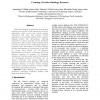Free Online Productivity Tools
i2Speak
i2Symbol
i2OCR
iTex2Img
iWeb2Print
iWeb2Shot
i2Type
iPdf2Split
iPdf2Merge
i2Bopomofo
i2Arabic
i2Style
i2Image
i2PDF
iLatex2Rtf
Sci2ools
CSB
2005
IEEE
2005
IEEE
Creating a Protein Ontology Resource
Protein Data Integration approaches at the moment considers data sources as data repositories, but not as applications; which in turn may embody complex interactions with other data sources. Current approaches do not provide methods both for generic mapping protein data representation, depicting interactions in data it describes and for interfacing existing data. The proposed Protein Ontology shows the value of hierarchy and relationships present in proteomics data. The creation of a Protein Ontology provides understanding of diverse types of data like: (1) Protein Entry Details, (2) 3D Structural Representations of Proteins, (3) Structural Folds and domains conserved in proteins, (4) Functional Domains and Families created based on Physiological and Pathological Functions of Proteins, and (5) Various Constraints like Genetic Defects and Chemical Properties of Cell that affect Final Stable Molecular Structure of Protein. Protein Ontology describes the concepts of interest in protein c...
| Added | 24 Jun 2010 |
| Updated | 24 Jun 2010 |
| Type | Conference |
| Year | 2005 |
| Where | CSB |
| Authors | Amandeep S. Sidhu, Tharam S. Dillon, Elizabeth Chang |
Comments (0)

